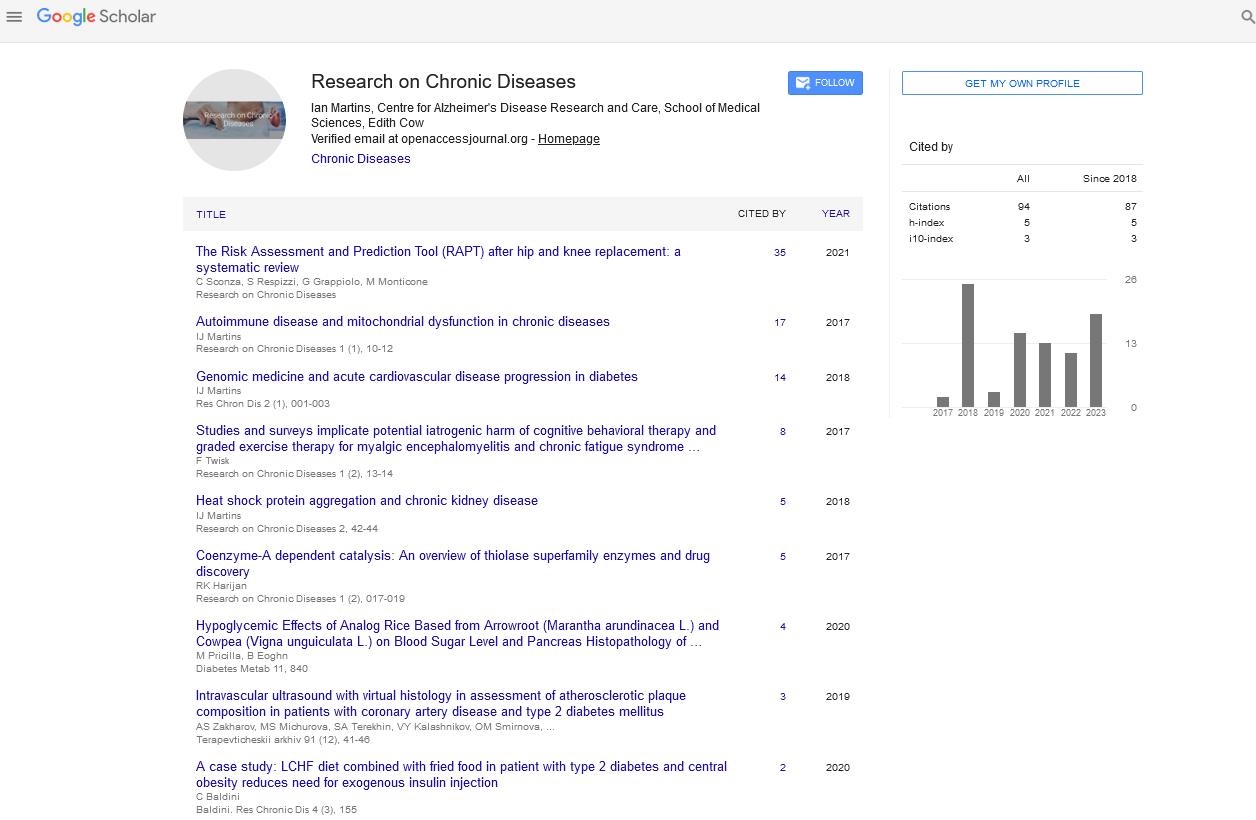Short Communication - Research on Chronic Diseases (2020) Volume 4, Issue 3
Protective and predisposing genes to chronic adrenal insufficiency in patients with APS 2,3,4 types and Graves disease polymorphism of HLA II, CTLA-4 and PTPN22 genes
Anna Larina
Endocrinology Research Centre, Moscow, Russian Federation
Abstract
This research was conducted under the research grant “Autoimmune endocrinopaties multiple organ failure that are genomic, postgenomic and metabolic markers. Genetic risk prediction, monitoring, early predictors, personalizedcorrection and rehabilitation.” Project number is 17-75-30035.
Introduction: Autoimmune polyendocrine syndromes (APS) are a heterogeneous group of diseases characterized by the presence of autoimmune dysfunction of two or more endocrine glands and other non-endocrine organs. The aim of the study was to determine the association of chronic adrenal insufficiency with polymorphism of HLA II, CTLA-4 and PTPN22 genes among patients with APS 2,3,4 types and patients with Graves’ disease. The focus of the study was on the revealing of protective genes for Addison’s disease in APS 3 type patients and in patients with Graves’ disease.
Materials and methods: The case-control study involved 116 patients with APS 2, 3, 4 types, 95 patients with Graves’ disease and 109 healthy subjects. Alleles of the HLA II class genes, CTLA4 and PTPN22were identified by the multiprimer allele-specific PCR method. The statistical analysis was carried out using the exact two-sided Fisher test. The association of the chronic adrenal insufficiency was determined by the value of the odds ratio (OR - odd’s ratio), the value of 95% confidence interval (95% CI).
Results: Haplotypes DR3-DQ2 (p < 0,0001; OR = 4.06), DR4-DQ8 (p < 0,0001; OR = 5.78), DQA1*0301 allele (p=0.000; OR = 4.27), genotype DQA1*0301/DQA1*0501 (p=0.000; OR = 13.89), and especially genotype DR3/DR4 (p=0.000; OR = 19.7) HLA=II class genes predispose to the development of APS type 2, 3 and 4 in adults compared to the control group. Genotype DR3/DR4 HLA II genes found the strongest association with the development of adrenal insufficiency in patients with APS (p < 0,0001; OR = 4.28). It is an independent risk factor of the development of APS type 2, 4 in patients with APS type 3 and patients with one autoimmune disease - Graves’ disease. Haplotype DRB1*01-DQA1*0101-DQB1*0501 has been determined as protective for the development of Addison’s disease. Frequency of DRB1*01- DQA1*0101-DQB1*0501 was significantly lower in the group of APS type 2, 4 comparing to the group of APS type 3 (р<0,01; OR=0.0769), Graves’ disease (p <0.05; OR=0.095) and the control group (р<0,01; OR=0.1138). There were no significant differences in the frequency of occurrence of the haplotype - DRB1*01- DQA1*0101-DQB1*0501 - in the type 3 APS groups, in patients with Graves’ disease and in the control group. Gene polymorphisms CTLA-4+ 49A/G (rs231775)and PTPN22 +1858C> T (rs2476601) are predisposing to the development of APS 2, 3 types compared with the group of Graves’ disease patients and the control group. A significant association between APS type 2, 3 and carriage of the CTLA-4 +49 A/G genotype (p < 0.01; OR 2.63) and PTPN22 +1858 CT genotype (p< 0.05; OR 3,96)was confirmed.
Conclusion: The revealing ofpredisposing andprotective genes to Addison’s disease in patients with APS type 3 and Graves’ disease will allow better predicting the risks of developing of the chronic adrenal insufficiency and the sudden onset of potential life-threateningcomplications (adrenal crisis)within the syndrome).
Publications
A Clinical Case of Type 2 Familial Polyglandular Autoimmune Syndrome
The association between the development of autoimmune polyglandular syndrome in adults and polymorphism of HLA class II genes and the predisposition to the development of chronic adrenal insufficiency in the context of these syndromes
Latent forms of adult-onset autoimmune polyglandular syndrome: Diagnosis and management of patients Autoimmune polyglandular syndromes in the adults: the genetic and immunological diagnostic criteria Metabolic control in patients with type 1 diabetes mellitus at the onset of primary adrenal insufficiency.
Biography
Anna Larina is an endocrinologist graduated from The Tver Medical Academy in 2008 and a postgraduate at the Endocrinology Research Centre, Moscow. Currently, she is working at a private medical centre. Her research interest is on the study of endocrine autoimmune diseases, especially Autoimmune polyendocrine syndrome, taking part in scientific research with patients with APS types 2, 3, and 4 and taking part in national and international conferences and she is also a member of RAE.
